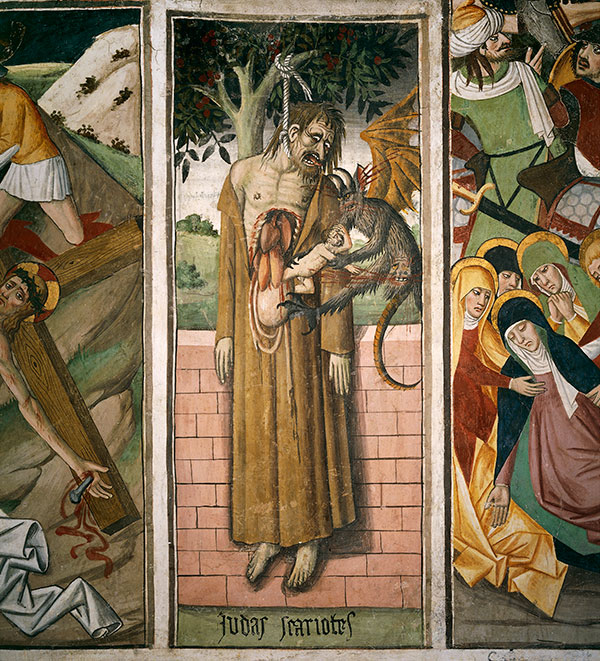Judas: not just in hell, but a “demonized human spirit”
By Hilary White
Until recently, I had no idea that there were some theological heavy hitters who hold that Judas’ sin was so horrific that it has in effect turned his soul into a kind of demonized spirit in hell. That he can actually “possess” people.
I will be doing a little reading on this, and maybe asking some experts and will get back to you with more.
Meanwhile, the idea that Judas was a “poor hapless chap who repented but hanged himself because the doctors of the law were mean to him” is a total fabrication of a twisted mind.
It is, however, a favourite fantasy of post-Christian secularists, as the many sympathetic depictions of the character in films will attest.
Here are some of the comments from Doctors and Fathers of the Church on Judas:
Judas never repented, Pope St. Leo the Great:
The traitor Judas did not attain to this mercy, for the son of perdition (Jn. 17:12), at whose right hand the devil had stood (Ps. 108:6), had before this died in despair; even while Christ was fulfilling the mystery of the general redemption. Even he perhaps might have obtained this forgiveness, had he not hastened to the gallowstree; for the Lord died for all evildoers. But nothing ever of the warnings of the Saviour’s mercy found place in that wicked heart: at one time given over to petty cheating, and then committed to this dread parricidal traffic. … The godless betrayer, shutting his mind to all these things [expressions of the Lord’s mercy], turned upon himself, not with a mind to repent, but in the madness of self-destruction: so that this man who had sold the Author of life to the executioners of His death, even in the act of dying sinned unto the increase of his own eternal punishment. (Sermon 62, De passione Domini XI [PL 54], in The Sunday Sermons of the Great Fathers, vol. 2, p. 183)
St. Augustine:
_For if it is not lawful to take the law into our own hands, and slay even a guilty person whose death no public sentence has warranted, then certainly he who kills himself is a homicide. … Do we justly execrate the deed of Judas, and does truth itself pronounce that by hanging himself he rather aggravated than expiated the guilt of that most iniquitous betrayal, since, by despairing of God’s mercy in his sorrow that wrought death, he left to himself no place for a healing penitence? … For Judas, when he killed himself, killed a wicked man, and passed from this life chargeable not only with the death of Christ, but also with his own: for though he killed himself on account of his crime, his killing himself was another crime. (The City of God, Bk. I, ch. 17)
_
St. Thomas Aquinas:
“To save Judas would … be contrary to [God’s] foreknowledge and disposition, by which He prepared for him eternal punishment; hence it is not the order of justice [as such] that renders impossible Judas’s salvation, but the order of eternal foreknowledge and disposition” (In IV Sent., dist. 46, qu. 1, art. 2, qa. 2, ad 3). As the use of grace is related to the final effect of predestination, so the abuse of it is related to the effect of reprobation. Now, in the case of Judas, the abuse of grace was the reason for his reprobation, since he was made reprobate because he died without grace. Moreover, the fact that he did not have grace when he died was not due to God’s unwillingness to give it but to his unwillingness to accept it—as both Anselm and Dionysius point out. (De veritate, q. 6, art. 2, obj. 11
~
